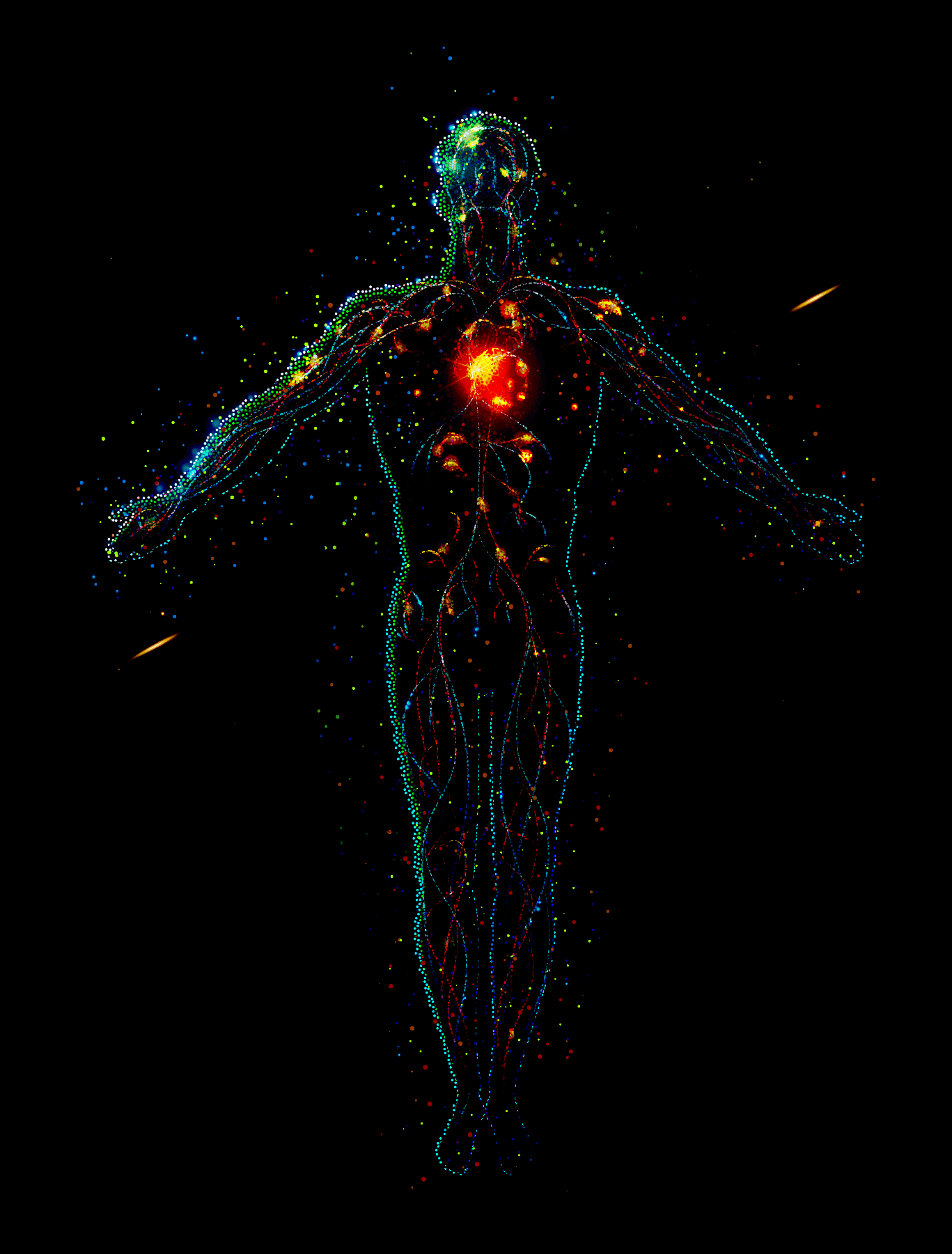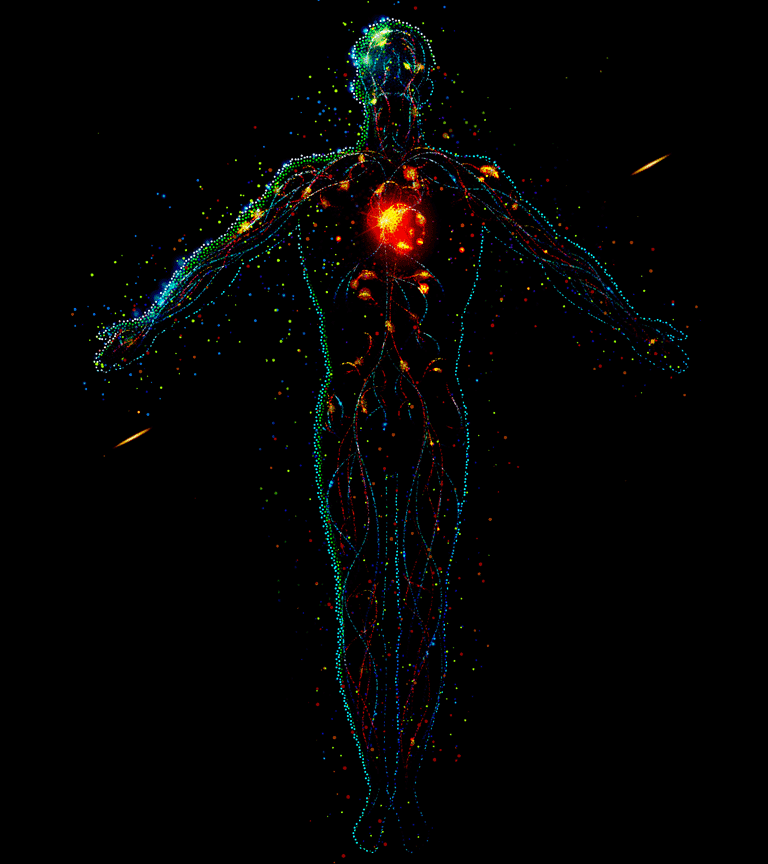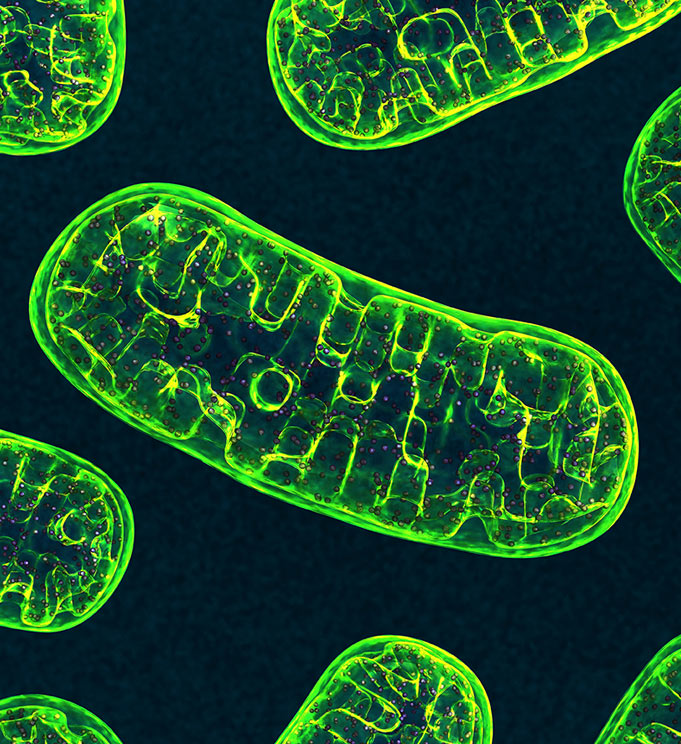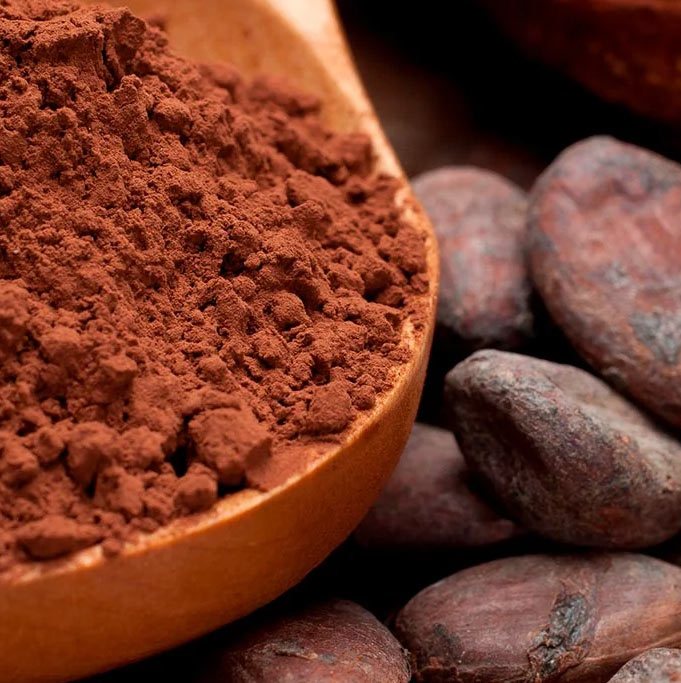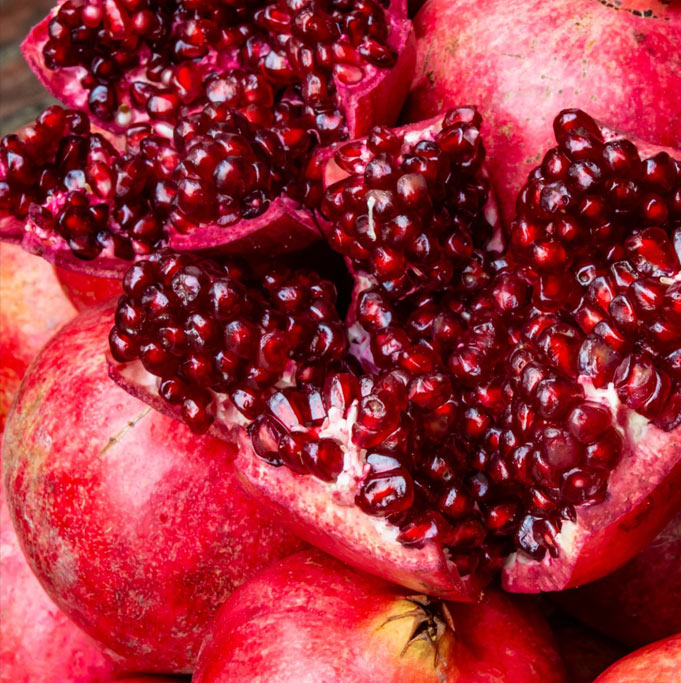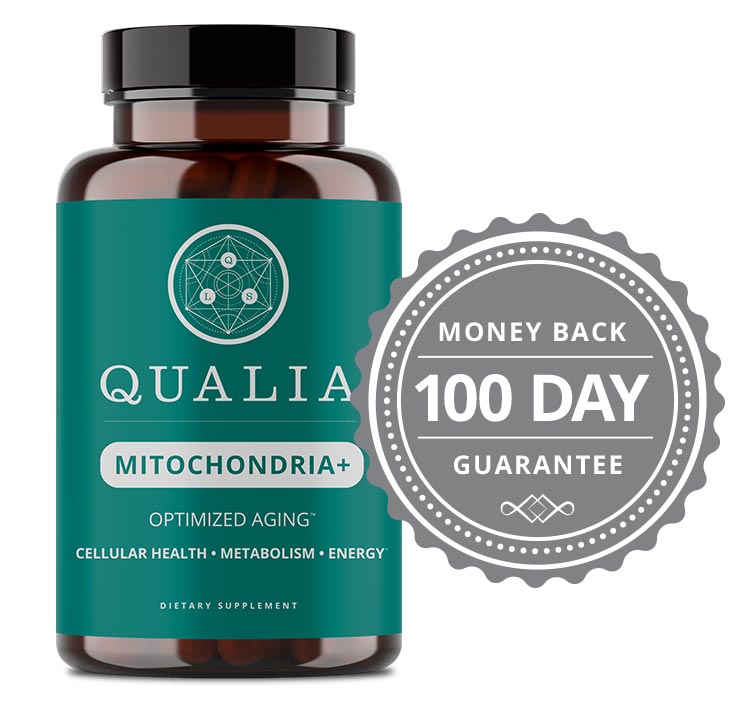PuremidineTM Spermidine (as spermidine trihydrochloride): Spermidine is a polyamine found in many food sources such as wheat germ, nuts, mushrooms, and fermented products. It’s well known for supporting autophagy (which can be thought of as a cell's natural recycling program). Spermidine also offers support for healthy stress response, DNA stability, brain health, and tissue repair.* We use PuremidineTM which is standardized for ≥98% spermidine trihydrochloride.
Pantothenic acid (vitamin B5): is part of the B complex—a group of water-soluble vitamins that play important roles in cellular metabolism and energy production. It is an essential vitamin and the precursor of Coenzyme A (CoA), a molecule that is ubiquitous in the human body and that participates in the key metabolic pathways for cellular energy generation. Vitamin B5 supports healthy adrenal function, which is why it is sometimes described as an “anti-stress” vitamin.*
Coenzyme Q10 (CoQ10): is an important fat-soluble nutrient, because it’s essential for cellular energy production (i.e., ATP) and antioxidant defenses, helping protect membranes from oxidative stress. The best vegetarian sources are foods high in fat, including nuts, seeds, avocados, and vegetable oils, but most CoQ10 is made by the body rather than being from diet, and its production often declines with age.
Lipoic acid (R-lipoic acid or alpha-lipoic acid): is an important mitochondrial compound because it’s used in helper molecules (i.e., enzymes) for the metabolic processes that convert food energy into cellular energy (ATP). The richest food sources are organ meats (e.g., kidney, liver) and vegetables such as spinach and broccoli. Many animal and human studies report functional benefits when diets are supplemented with extra lipoic acid.* We use Bio-Enhanced®, Stabilized R-Lipoic Acid (sodium R-alpha-lipoic acid), the most bioavailable and potent form of lipoic acid.
Pyrroloquinoline quinone (PQQ): is thought of as a non-vitamin growth factor, supporting healthy metabolism and gene expression. PQQ is often categorized as a mitochondrial nutrient, supporting mitochondrial efficiency, so they are more capable of converting dietary fats and sugars into cellular energy. PQQ also plays roles in promoting a healthy gut microbiome, immune system function, antioxidant defenses, and cognitive function. In the brain, it appears to be especially important in supporting healthy memory and cognition with aging. Some of the best food sources include spinach, parsley, and kiwifruit.*
Magnesium (as Aquamin® magnesium hydroxide): is one of the most abundant minerals in the body and plays a vital role in supporting the function of all living cells. It’s used in more than 300 enzymes. ATP (i.e., cellular energy) occurs complexed with magnesium, so all enzymes utilizing ATP require magnesium to support their activity. Because magnesium supports the electrical functions of cells, it’s necessary for muscle and nerve function. Aquamin® Mg is a bioavailable source of magnesium that also contains lesser amounts of 71 other minerals, and it has been studied for supporting gut microbiota.*
L-cystine: is the chief sulfur-containing compound in protein. It is found in eggs, meat, dairy products, and whole grain foods. Inside cells, L-cystine is metabolized into L-cysteine, which, along with glutamine and glycine, is used to make an important detoxification and antioxidant molecule called glutathione. L-cystine has important structure and function roles in immune cells, skeletal muscle, and connective tissue.*
Betaine: is a compound originally found in sugar beets (Beta vulgaris), which is the source of its name. Betaine plays a central role in methylation and is involved in the synthesis of important neurotransmitters. It also supports aspects of sports performance, NAD metabolism, and brain health.*
L-Tryptophan: is an essential amino acid. Many recognize it as the compound in turkey known for inducing sleepiness, but L-tryptophan is also found in abundance in many plants. Ours is vegan sourced, and L-Tryptophan is a precursor used by the body to make melatonin, as well as NAD+ and serotonin, supporting sleep and calm mood among many other health benefits.*
L-carnitine: (also known as levocarnitine) is an important molecule because it’s needed to convert fat into energy. The name carnitine is derived from Latin “carnus” (flesh), because it was originally found in meat extracts, though ours is vegan. L-carnitine’s most important role is in mitochondrial fat metabolism—it is used to transport long-chain fatty acids across the mitochondrial membrane for breakdown by mitochondrial β-oxidation. This transportation function allows fats and oils from our diet to be used for energy production.
Niacin (Vitamin B3): is a member of the B-complex vitamin family and a brain essential nutrient. It supports healthy NAD+ levels, energy production, antioxidant defenses, and cellular repair and stress response functions. Vitamin B3 is critical for maintaining the health of the central nervous system.*
Niacinamide (vitamin B3): Compounds with niacin activity are defined by their ability to contribute the nicotinamide (i.e., niacinamide) unit of an important molecule called NAD. NAD is found in every cell in the body. It's used to (1) make cellular energy (ATP), (2) protect cells from damage, and (3) activate processes linked to healthier aging. Research shows that as we age levels of some NAD metabolites (NAD+ as an example) decline substantially. Many healthy aging scientists and doctors believe maintaining higher levels of NAD+ is one of the keys to increasing the amount of time we spend in good health.*
Vitamin B12 (as methylcobalamin): Vitamin B12 is a B-complex vitamin and a brain essential nutrient. Methylcobalamin is the coenzyme or “active” form of vitamin B12, supporting the healthy function of brain and nerve cells, and is needed for the production of myelin. Methylcobalamin is involved in promoting healthy dopamine, melatonin, noradrenaline, serotonin, and supports healthy hearing and vision.*
Folates: encompass all the different forms of vitamin B9 (the ninth of the B-vitamins discovered). These include folic acid (used in food fortification and most supplements), folinic acid (also called calcium folinate) and L-5'-methyltetrahydrofolate. Folates got their name from the Latin word for leaf (folium), because many leafy green vegetables are rich in folates. They are critical for the production and maintenance of new cells, playing a key role in DNA expression and repair.
Citrus sinensis L. Fruit Extract: includes sweet oranges and blood oranges. The peels and fruit are a rich source of nobiletin, a citrus flavonoid that supports healthy blood vessels and veins, and promotes antioxidant defenses and a balanced cellular response. We use an extract with a particularly potent 40% nobiletin standardization. Nobiletin also supports circadian rhythm among its many other notable health benefits.*
Apigenin (from Citrus grandis fruit extract): is a flavone found in many fruits and vegetables. It has been reported to support cardiovascular, brain, and kidney function, with metabolic benefits. It indirectly boosts NAD+ by promoting the activity of the CD38 NAD+-consuming pathway. Apigenin is also supportive of antioxidant defenses and the mitochondrial cellular energy network.*
Rosemary Leaf Extract (Rosmarinus Officinalis): is a member of the mint family, and contains a range of health-supporting polyphenols, including diterpenes (such as carnosol, carnosic acid, rosmarinic acid) and a triterpene called ursolic acid. Triterpenes are produced by plants as part of their self-defense mechanism. Ursolic acid benefits include support for the body’s healthy response to exercise (antioxidant defenses, insulin balance, sirtuin function, and AMPK activity). It also supports the development of new muscle fibers and muscle rejuvenation.*
Creatine monohydrate: plays a key role in tissues, like muscles and the brain, that use high amounts of energy. Because it concentrates in muscles, the best food sources for creatine are red meat, pork, lamb, poultry, and fish. So creatine as a dietary supplement for vegans and vegetarians should be considered (such as vegan-friendly creatine monohydrate). Creatine is used in the phosphocreatine (phosphagen) system. This system regenerates ATP from ADP in tissues, and is especially important in circumstances with high energy demand.*
Vitamin K2 (as K2VITAL® Menaquanone-7): Vitamin K is a collective term for a group of structurally related fat-soluble molecules (vitamers) that act as a cofactor for a carboxylase enzyme. This enzyme transforms glutamate residues in proteins to carboxyglutamate residues, which plays an important role in blood clotting and bone health. Dietary forms of vitamin K fall into two categories: (1) vitamin K1 (phylloquinone), which is obtained from vegetables, and (2) vitamin K2 (menaquinone), which is obtained from products of animal origin or fermented foods. Ours is vegan sourced as K2VITAL® Menaquanone-7, a particularly bioavailable form.*
Inositol : used to be considered part of the B-complex of vitamins (it was called vitamin B8), but because we can make it in the body, it’s no longer classified as a vitamin. In the body, inositol is found in cell membrane phospholipids, plasma lipoproteins, and (as the phosphate form) in the cell nucleus (the home of our DNA). We use inositol in this formula to support healthy hormone signaling—insulin and thyroid especially. Inositol acts as a second messenger, translating hormone messages that act on the outside of cells into intracellular signals involved in energy production, growth, and repair.*
Riboflavin Riboflavin (B2): is a member of the B-complex vitamin family and a brain essential nutrient. It supports optimal brain energy production, the production of glutathione (a cellular antioxidant), and healthy adrenal function. Riboflavin is needed for myelin and is used in the metabolism of fats, which is critical in the brain since it is mostly made of fats.*
Vitamin B6 (as pyridoxal 5'-phosphate): Vitamin B6 is a member of the B-complex vitamin family and a brain essential nutrient. Pyridoxal 5'-phosphate is a coenzyme (i.e., active) form of vitamin B6. It supports the healthy production of brain glucose and energy metabolism. Vitamin B6 is directly or indirectly needed for supporting the production of neurotransmitters related to motivation, focus, and mood, and also supports general immune health.*
Vitamin B1 (Thiamine): is a member of the B-complex vitamin family and a brain essential nutrient. It supports healthy brain energy metabolism, neuron health, neurotransmission, and adrenal gland function. It also supports energy metabolism and metabolic health.*
Biotin: or vitamin B7, is part of the B complex—a group of water-soluble vitamins that play important roles in cellular metabolism and energy production. Biotin was originally called vitamin H, with “H” standing in for Haar und Haut, German words for hair and skin. Biotin is an important cofactor in some enzymes involved in metabolizing fats and carbohydrates, influencing cell growth, and affecting amino acids involved in protein synthesis, and supports both gene expression and cellular metabolic pathways.*
Vitamin B12 (adenosylcobalamin): is unique among vitamins because it contains a metal ion, cobalt, from which the term cobalamin derived. Adenosylcobalamin is one of the two coenzyme forms of vitamin B12 (the other is methylcobalamin). These are the forms used in enzymes in the human body. Adenosylcobalamin is used in only one enzyme, L-methyl-malonyl-CoA mutase.



















































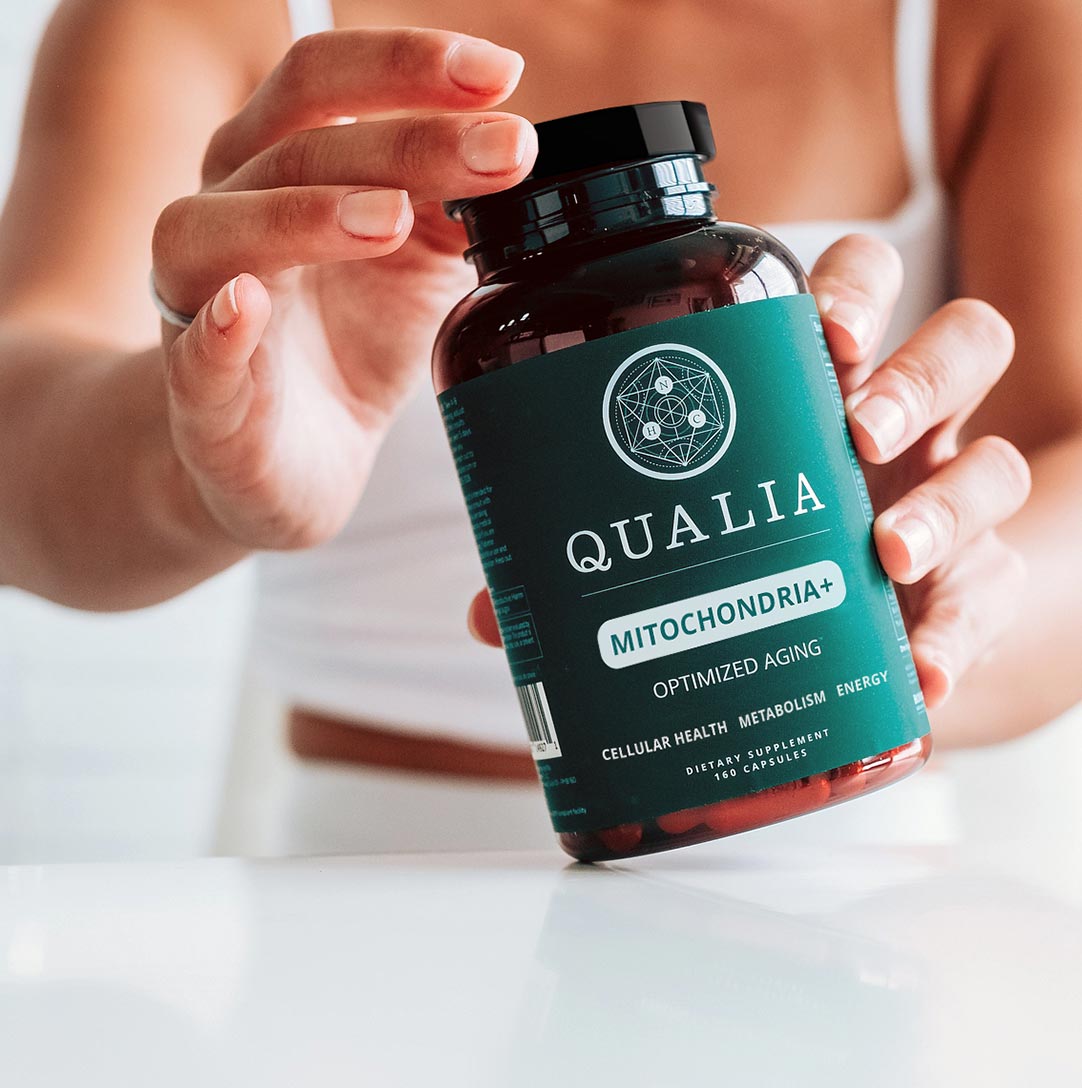
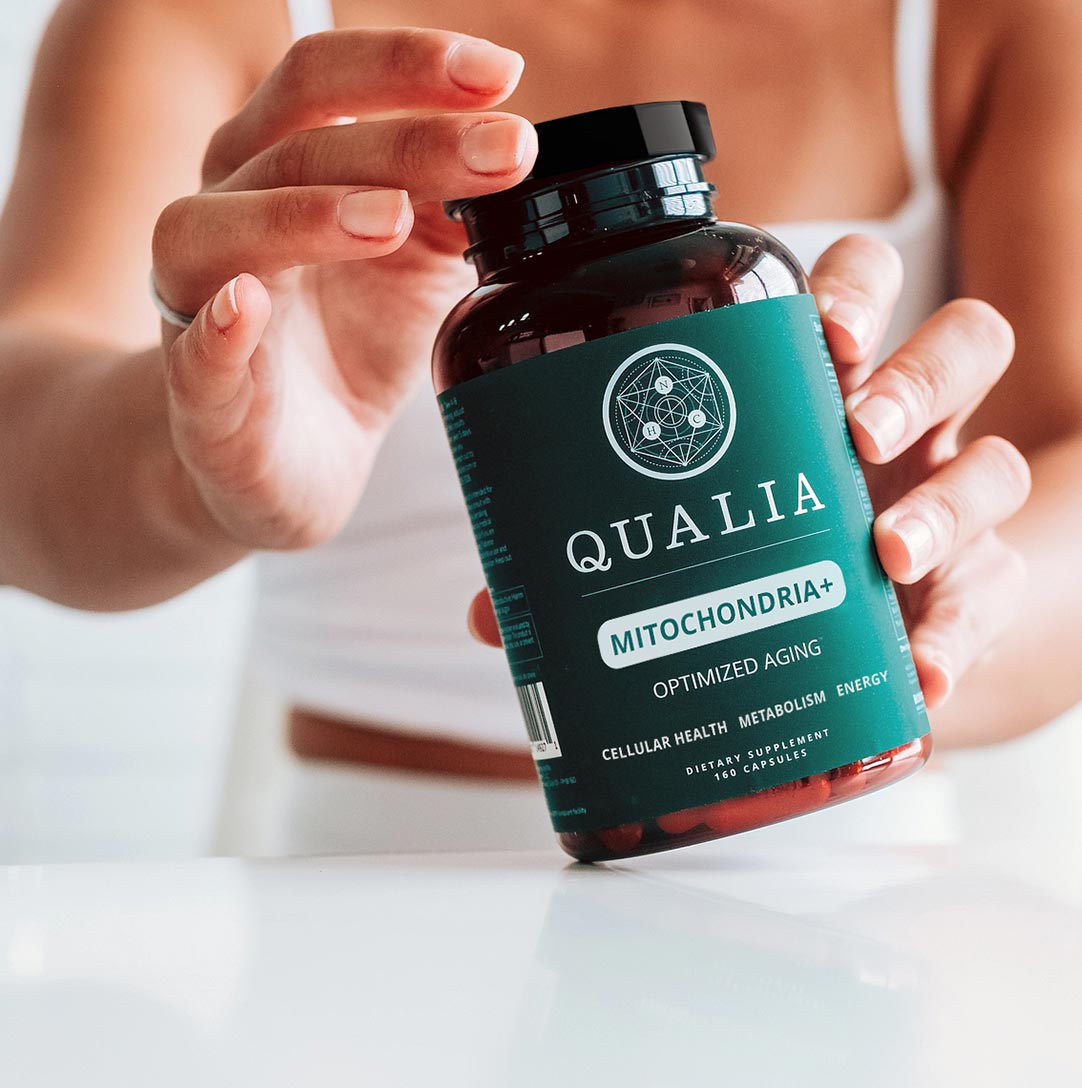
 Elevated energy.*
Elevated energy.* Better stress management.*
Better stress management.* Healthy metabolism.*
Healthy metabolism.* Enhanced longevity.*
Enhanced longevity.*